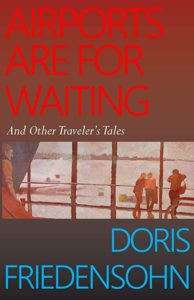Author: Doris Friedensohn (Full Court Press, Englewood Cliffs, NJ, 2018)
Reviewed by Theresa Forsman
“The charm, one might say the genius of memory, is that it is choosy, chancy, and temperamental: It rejects the edifying cathedral and indelibly photographs the small boy outside, chewing a chunk of melon in the dust.”
Elizabeth Bowen, Irish-born author, 1899-1973
When Doris Friedensohn went to Mozambique, Mexico, Portugal, Palestine and many other countries over the last fifty-plus years, she never took photographs. Instead, she took notes on what she wanted to remember. Most often, she wanted to remember people, sometimes collectively but often individually, those who illuminated the local culture, who upended her notions of that culture, or who had a story that overlapped with and often clarified her own.

She has collected these people and places in her new book, Airports are for Waiting and Other Traveler’s Tales, covering trips from 1962 (Puerto Rico) to 2018 (Vietnam). As a longtime member of a monthly writing group that includes the author, I read some of these tales in their pre-book form. These engaging, often fascinating essays and mini-essays (300-word “postcards”) are set in more than 30 locales, including an airport, the place that caters to the urge to stay in motion and at the same time guarantees a temporary halt to that motion. Friedensohn, a retired American Studies and Women’s Studies professor, often traveled as an academic, other times as a student honing her writing or foreign-language skills, sometimes simply to vacation.
Race Relations
More than one story in the book makes a stark point about race relations. When Friedensohn visited Conakry, Guinea, in late 1998, few of her friends or colleagues would have been able to locate the African country on a map. Barely three months after her trip, a map showing Guinea’s location was on the front page of the New York Times, part of the weeks-long coverage of the killing of Amadou Diallo, a 22-year-old unarmed Guinean immigrant. He was the target of 41 bullets, fired by four police officers, as he stood unarmed in the vestibule of his apartment house in the Bronx. As a visiting academic to Guinea’s University of Conakry, Friedensohn had defended African-Americans against criticism from some of the Guinean teachers in one of her seminars. They compared Guinean values of family responsibility, hard work, and delayed gratification with what they saw as the result of African-American values: drug abuse, crime, single parenthood and welfare dependency. Friedensohn’s defense of African-Americans—ingrained racism in the U.S. that leads to discrimination and stereotyping of all kinds, to police brutality – didn’t persuade many in her seminar. The Times’ news coverage about Amadou Diallo mentioned his work ethic and his middle-class family’s traditional values.
Almost all countries hold surprises for this perceptive traveler. In Nuremberg, she learns that Germans, full of “shame and decency,” are taking moral responsibility for their country’s Nazi past; in Gori, Georgia, she sees that the 21stCentury residents still honor their famous hometown boy, Josef Stalin. In Palestine, the number of tourists on hand for the Samaritans’ sacrificial Passover rituals outnumber nearly tenfold the Samaritans themselves, who are dying out because of their rule about marrying within the community.
On some of her trips, the author is alone. In recent years, she is with her partner, Paul Lauter, retired literature professor. In earlier decades, she is with her late husband, the painter Elias Friedensohn, or another relative, a friend or colleague.
What about the Women?
Forty years ago, on a Tunisian island known for its ancient Jewish community, the author and her husband watched men in a traditional, high-energy prayer ceremony as their dancing approached frenzy. The painter wonders how to capture their spiritual fervor on canvas as his wife wonders about the absence of women in the synagogue. Are they confined to cooking and other household chores while the men levitate?
The status of women was still on Friedensohn’s mind early this century during her regular visits to Guatemala, where she honed her fluency in Spanish with teacher Susana. The side lessons were grammar and syntax; the main lessons emerged from Susana’s life. The mother of two young children couldn’t legally have her tubes tied before age 30 without a husband’s written consent, although there were no such restrictions on men. Susana was unmarried, living with the father of her children, and counting the months to her 30thbirthday. Teacher and student discussed what they had in common, including that they both valued their professional life and both had become pregnant while young and unmarried. They also talked about what they did not have in common. “In Guatemala, we have our babies,” Susana said in response to Friedensohn’s story of her illegal abortion in 1962. Twenty years ago, could either of them have imagined the recent, crippling assaults on abortion rights in the United States?
Would Obama be Enough?
In Portugal in early 2009, the traveler is reunited with colleagues from a Fulbright stint at the University of Coimbra in the 1980s. She shares her elation and relief at the election of smart, trustworthy Barack Obama. Her Portuguese colleagues are skeptical. Obama’s intelligence, ethics and eloquence were enough to make him the first black U.S. president, but would those qualities be enough to change America’s wealth gap, concentration of corporate power, deep-seated racism? At the time, Friedensohn could hope.
Through this collection of essays, gracefully written by an astute observer, Friedensohn shares with us the education that travel provides. Whether the story is set in a popular destination or in a locale most of us will never visit, it is told by someone who notices the boy in the dust chewing a chunk of melon. Her navigation of the world’s human terrain enlarges our knowledge of other cultures and in the process shifts our perspective on the few square feet that each of us occupies, no matter where we are.
Theresa Forsman is a member of the Ethical Culture Society of Bergen County.


